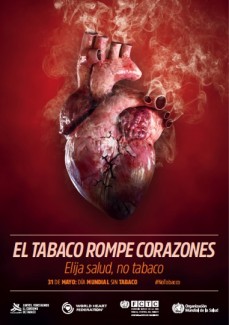World day without tobacco 2018: Tobacco and heart disease

World day without tobacco 2018: Tobacco and heart disease
May 31, 2018
On 31 May of each year, the who and its partners celebrated the world no tobacco day in order to highlight the risks associated with smoking, both for health and other areas, and advocate for effective policies to reduce their consumption.
The theme of the world day without tobacco 2018 is: "Tobacco and heart disease". The campaign aims to draw attention on:
- the relationship between tobacco and heart disease and other cardiovascular diseases, including stroke, which, together, are the main causes of death in the world;
- possible measures and actions that major recipients, including Governments and the public in general, can be taken to reduce health risks caused by tobacco use.
The world day without tobacco 2018 coincides with a series of initiatives and global opportunities to reduce the tobacco epidemic and its impact on public health, which are, primarily, a great number of deaths and much suffering of millions of people in Everybody. These measures include initiatives Global Hearts and RESOLVE supported by who, which aims to reduce mortality from cardiovascular disease and improve the care to them, as well as the third meeting of high level of the Assembly General of the United Nations on the prevention and Control of diseases not transmissible, which will take place in 2018.
The dangers of smoking to the heart health of people around the world
This year, world no tobacco day focuses on the impact of tobacco use on the cardiovascular health of people around the world.
Tobacco use is a major risk of coronary heart disease, stroke, and peripheral vascular disease factor.
While well known harms heart health caused by tobacco and the availability of solutions to reduce the morbidity and mortality caused by, large sections of the population are unaware of is one of the main causes of diseases cardiovascular.
Data on tobacco and on heart disease and other cardiovascular diseases
Cardiovascular diseases are the leading cause of death worldwide, and tobacco use and exposure to tobacco smoke contribute to about 12% of deaths from heart disease. Tobacco is the second leading cause of cardiovascular disease, after high blood pressure.
The global epidemic of tobacco causes more than 7 million deaths each year, 900 000 of which people are non-smokers who breathe second-hand tobacco smoke. About 80% of the more than 1000 billion smokers that exist in the world live in middle- and low-income, countries that are those who bear the greatest burden of disease related to this product.
The who MPOWER program measures are in conformity with the framework Convention on Tobacco Control (WHO FCTC) who and can be useful for Governments to reduce tobacco use and protect its citizens from the ENT. These measures are as follows:
- Monitor: monitor tobacco use and prevention policies;
- Pprotect: protect the population from exposure to tobacco smoke by prohibiting the consumption of this product in closed public spaces, workplaces and public transport;
- Oroffer: providing support for smoking cessation aid generalised to all smokers and with coverage of costs, which include a brief advice offered by health workers and national telephone lines of help, no cost to the user;
- Warn: warning of the dangers of tobacco using a neutral/standard packaging and/or large graphic health warnings on all tobacco packages, and carry out effective campaigns in the media to warn to the population of damage caused by the consumption of this product, and exposure to tobacco smoke.
- Enforce: prohibit all forms of advertising, promotion and sponsorship of tobacco; and
- Raise: increase taxes on tobacco products and to make them less affordable.
The world day without tobacco 2018 campaign objectives
This year, the goals are as follows:
- to highlight the relationship between the consumption of tobacco products and heart disease and other cardiovascular diseases;
- increase the awareness of the population in general about the consequences for the cardiovascular health of the consumption of tobacco and exposure to tobacco smoke;
- provide to the general public, Governments and other recipients the possibility of committing to promote heart health and protecting people from the consumption of tobacco products; and
- encourage countries to strengthen the implementation of the MPOWER tobacco control measures contained in the WHO FCTC, whose effectiveness is proven.